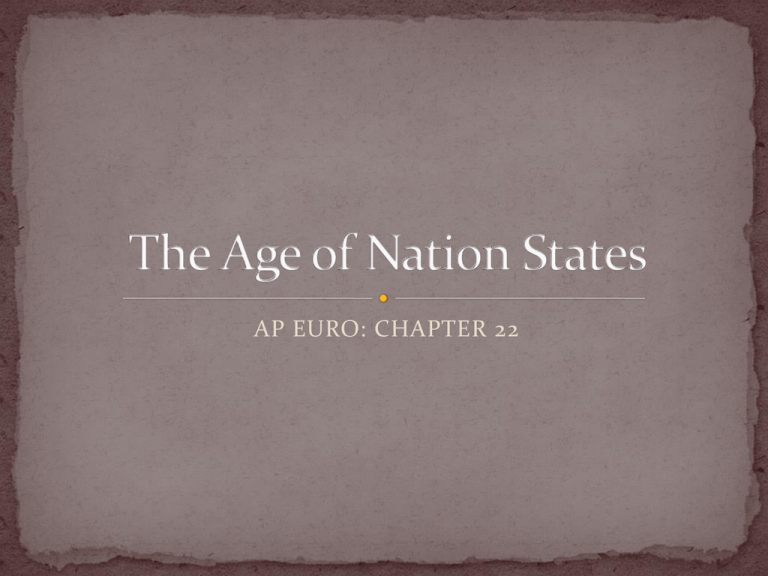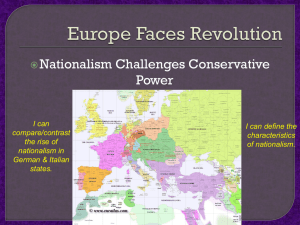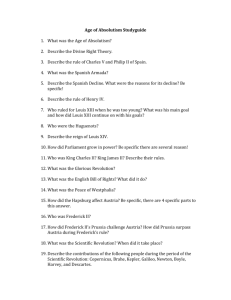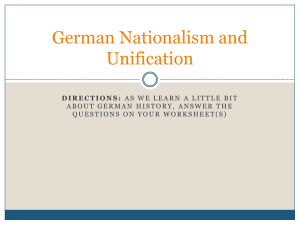The Age of Nation States
advertisement

AP EURO: CHAPTER 22 General Desires: 1. Constitutions 2. Independence and unification of nationalist groups 3. End of Serfdom and Manorial Dues in Eastern Europe Socio-economic Factors: 1. Food Shortages 2. Widespread Unemployment 3. Harsh life in the Cities 4. Economic Depression 5. Overburdened systems of poor relief Middle Class Push for change Gain support from urban working class Opt for violent tactics An important common factor in the uprisings Nationalism: belief that one is part of a nation defined as a community with its own language, traditions, customs, and history. Primary focus of a person’s loyalty & sense of identity Sought to create national states: Germans, Hungarians, Italians, Czechs Loose confederation of 39 states led to Unification 1784 J.G. Herder published : Ideas of the Philosophy of the History of Mankind Volkgeist- “spirit of the people” Herder argued German Volkgeist is different Focused on what makes Germans different from other people The German spirit (customs, traditions, folklore) is not only different, but superior Must be kept “pure” from outside influence Urged unity based on language, history, & folk traditions Traveled throughout Germany Gathered folk tales Which represent spirit of the people (volkgiest) The Bremen Town-Musicians Cinderella The Frog King Hänsel and Grethel Little Red-Cap Little Snow-White Rapunzel Collection of Stories – Carnegie Mellon University https://www.cs.cmu.edu/~spok/grimmtmp/ http://www.youtube.com/watch?v=nMx7GmTw5n4 Early socialist philosophy Dialectic- all history results from series of change “Thesis” -> “AntiThesis” (conflicting ideas) “synthesis” - fusion Argued that for nation to develop its culture, A nation must have cities, factories, and capital of its own. Possible German Unification Debated: Problem: individual state rulers did not want to give up their power! Austria & Prussia opposed unification Members of Assembly: Lawyers, government officials, Catholic clergy, businessmen etc. Had No desire for revolution, disconnected from masses How do you define “Germany”? Would a unified Germany include Prussia? Austria? Bohemia? Large German Solution –grossdeutsch Small German Solution - kleindeutsch Assembly Produces 2 Documents: 1. Declaration of the Rights of the German People (freedom of religion, press, assembly) 2. Constitution – for unified Germany (excludes Austria) Frankfurt Parliament failed & dissolved German unification failed at this point in time Prevailed 20 years later Transformed the balance of economic, military, & international power. Trade Partnership Included all German states except Austria & Bohemia Promoted economic growth Austria & Bohemia left out and hurt economically Led by Prussia New King took over throne: William I In 1862 he made a decision that changed German History… Prime Minister of Prussia in 1862 “Machivellian” , “Opportunistic” leader Enlarged & reformed army Built railroads to transport troops “The great questions of our day cannot be solved by speeches and majority votes- that was the great error of 1848 and 1849- but with blood and iron” A Unified Germany that excluded Austria Kleindeutsch – “small Germany” Policy of “Friendliness” towards Russia Austria was upset Austria wanted to join Zollverein (trade partnership) Bismarck rejected Austria’s application! “German” states south of Denmark Ruled by Denmark People rebelled against Denmark 1848 1852 international agreement placed both under Danish authority 1863 Austria & Prussia went to war against Denmark 1864 Austria & Prussia won Prussia occupied Schleswig Austria occupied Holstein Rivalry between Prussia and Austria re-emerged Prussians had to go through Holstein to get to Schleswig… Bismarck’s perspective? Austria is in the way! Promised Italy Venetian territory if They (Italy) allied themselves with Prussia and went to war against Austria How did Bismarck provoke war? Prussia vs. Austria Lasted 3 weeks Bismarck accused Austria of aggression & invaded Holstein Prussia had better soldiers, new technology “needle gun” (1st machine gun), railroads Prussia won 1. Bismarck dissolved German confederation (39 states) 2. With Austria excluded, Bismarck created the North German Confederation dominated by Prussia (22 states) 3. Prussia’s ally, ITALY acquired Venetia New confederation had Constitution & Bicameral Parliament William I now “ President” Otto von Bismarck now “ Chancellor” https://www.youtube.com/watch?v=5gGBtGCdq9M https://www.youtube.com/watch?v=KjfSKhjqxDk http://education-portal.com/academy/lesson/the- unification-of-germany-summary-timelineevents.html APEURO Louis XVIII returned as Constitutional Monarch (1815) Charles X was his successor (1824) King Charles X Issued “July Ordinances” 1. Dissolved chamber of deputies 2. Censored Press Caused Immediate protests Louis Philippe, Duke of Orleans Downplayed “royal image” Reign lasted 18 years until 1848 In support of electoral reform Francois Guizot, Prime Minister forbade gatherings Army fired against crowd = rebellion Guizot quit, Louis Philippe abdicated throne Was set up while debates ensued… 1.Orleanists wanted Louis Philippe’s son to take over 2. Legitimists wanted a leader of Bourbon descent 3. Socialists wanted Louis Blanc as leader 4. Louis Napoleon, nephew of O.G. wanted power Set up National Workshops to ease economic crises More applicants than jobs People protested Elections held for National Assembly Conservatives won, riots in Paris ensued Violence escalated 1,500-10,000 dead, or injured 4 candidates ran for “President” Louis Napoleon Bonaparte won by a landslide “Napoleon can be everything to everybody because is virtuously unknown” – Karl Marx 1. Banned public meetings 2. Expelled socialist members of assembly 3. Imposed censorship 4. Took away vote from the poorest 5. Returned control of all schools to the Church 1. Returned universal male suffrage 2. Called for popular vote and was elected for a 10 year term as President! Why? 1850 Proclaimed himself Emperor Napoleon III!! :Louis Napoleon) Louis Napoleon III Built boulevards, parks, monuments, railroad stations, public buildings Modernized sewers, water supply PROJECTS PROVIDED JOBS! 1. Credit Mobilier- loans $ to public 2. Credit Foncier – Loans $ to landowners to improve agriculture 3. Railroads, builds steamships 4. Hospitals, asylums, distributes free medicine 5. Authorized unions & labor strikes Ferdinand de Lesseps & Company Constructed the Suez Canal in Egypt (18591869) Completed in 1884 Paris, Arrived in New York 1885 Pedestal completed 1886 Designer: Gustaf Eiffel World’s Fair observation tower People thought of it as “ugly” Completed: 1889 Designer: Gustav Eiffel Louis Napoleon & Mexico Mexico could not repay their debts… So France Invaded 1862 La Batalla de Pueblo People of Puebla defeated French Army! May 5th 1862 “Cinco de Mayo” But… France won the war Austrian Archduke Maximilian & wife Charlotte (Maximiliano & Carlotta) Emperors of Mexico! “Puppet Rulers of Mexico 1863-1867 Spanish crown vacant Spain offered the crown to a cousin of William I (of Prussia) France (Napoleon) opposed idea Bismarck became involved… Bismarck spread rumors that Napoleon III Wanted to seize Belgium & Luxemburg France sent reps to see William I “Ems Dispatch” French message: No Prussian King in Spain in the near future! Bismarck’s version of the French Message: “France has insulted the German People!” Bismarck orchestrated Franco-Prussian War 1870 Easily Defeated Prussians captured Louis Napoleon III France declared itself a Republic (again) Paris wouldn’t surrender- 4 month seige Starving Parisians ate rats… & zoo animals 1871 French Citizens voted for A National Assembly Assembly voted to form a republic w/ President, 2 chamber Parliament, council of ministers headed by Premier Mid 19th Century a dozen small states, plus some tiny ones Economic disparity: Prosperous north, Agricultural south Obstacles: Austrian presence in the North, Papal Power in Central Italy Secret society of Italian nationalists emerged 1. “The Carbonari” Joseph Mazzinispokesperson 2. 1831 new group emerged “Young Italy” In Northern & Central Italy Insurgent groups surrendered to Austrian army, or Papal forces Mazzini exiled Attempted revolts again 1834-1836, and 1844 Northern Italian Kingdom of Piedmont & Sardinia invaded Lombardy and Venetia Northern Italian territories occupied by Austria Joined Cause Uprisings lasted 3 months Leaders of movement: intellectuals, Professors, Students, Writers, Idealists The Minister to the Pope was assassinated The Pope fled Rome Radicals declared Mazzini one of 3 rulers King of Piedmont-Sardinia invaded Lombardy again French army restored the Pope Austrian troops queledl insurrection in Piedmont Became Prime Minister of Piedmont-Sardinia 1852 Goal: to expand borders of Piedmont throughout Northern Italy Austria occupied Venetia & Lombardy Cavour created agreements with Britain & France Cavour Promised France Nice & Savoy France made an Agreement with Austria Treaty of Villafranca: 1. Piedmont gained Lombardy only 2. France gained Nice & Savoy army of “red shirts” Garibaldi’s army marched north Cavour’s army marched south They met at center Did not include Venetia in the north (Austria) Or Rome (Papal State) Italy received Venetia 1866 as a reward for siding with Prussia 1870 Rome joined Italy, is named capital Papal control reduced to Vatican (recognition as independent state 1920’s) 1. Italy’s new government not very democratic 2. Economic disparity – North & South 3. Italy Lacked natural resources 4. Papacy disapproved of new government 5. People confused; can a “good Catholic” be a “good patriot” ?





